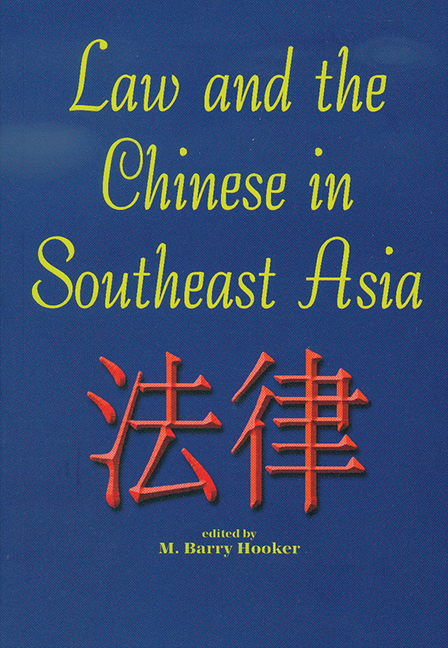Book contents
- Frontmatter
- Contents
- Preface
- The Contributors
- 1 Law and the Chinese Outside China: A Preliminary Survey of the Issues and the Literature
- 2 The Legal Position of the Ethnic Chinese in Indochina under French Rule
- 3 Law and Memory, De Jure to De Facto: Confucianization and its Implications for Family and Property in Vietnam
- 4 English Law and the Invention of Chinese Personal Law in Singapore and Malaysia
- 5 The Indonesian Chinese: “Foreign Orientals”, Netherlands Subjects, and Indonesian Citizens
- 6 Chinese Family Firms in Indonesia and the Question of “Confucian Corporatism”
- 7 China's Citizenship Law and the Chinese in Southeast Asia
- Index
Preface
Published online by Cambridge University Press: 21 October 2015
- Frontmatter
- Contents
- Preface
- The Contributors
- 1 Law and the Chinese Outside China: A Preliminary Survey of the Issues and the Literature
- 2 The Legal Position of the Ethnic Chinese in Indochina under French Rule
- 3 Law and Memory, De Jure to De Facto: Confucianization and its Implications for Family and Property in Vietnam
- 4 English Law and the Invention of Chinese Personal Law in Singapore and Malaysia
- 5 The Indonesian Chinese: “Foreign Orientals”, Netherlands Subjects, and Indonesian Citizens
- 6 Chinese Family Firms in Indonesia and the Question of “Confucian Corporatism”
- 7 China's Citizenship Law and the Chinese in Southeast Asia
- Index
Summary
This collection of essays emanate from a conference held at the Australian National University in 1998 on the subject of “Law and the Chinese Outside China.” As it happened, the majority of the papers were concerned with the Southeast Asian diaspora Chinese, particularly in French Indochina and Vietnam, Malaysia, Singapore, and Indonesia; these areas are the main foci of this collection.
Two things very quickly became apparent from the material. First, from the legal perspective, it falls into one of three classes. These are: (i) Chinese legal thought outside China, (ii) laws of the diaspora Chinese and (iii) laws for the diaspora Chinese. In chapter 1, I attempt a detailed description of this classification.
Secondly, the idea of “Confucian” or “neo-Confucian” appears in a number of guises. It may be that a more purely analytic rather than merely descriptive study of diaspora Chinese law could usefully concentrate on this usage.
The authors and I are well aware that this collection is a preliminary contribution to this subject and that much remains to be done, especially in the West and South Pacific. Do our initial three classes hold up, and what of “Confucian” in these areas?
Funding for the 1998 conference was provided by the Chiang Ching-Kuo Foundation to whom we express our thanks. Thanks are also due to Professor Wang Tay-Sheng of the National Taiwan University. We also acknowledge the Faculty of Law, Australian National University for providing the funding for the index done by Mr Alan Walker.
The contributors and I owe a huge debt to Professor Wang Gungwu, doyen of diaspora Chinese studies, for his valued support in this project. We are also grateful to our colleagues from the Asian Law Centre, University of Melbourne: Associate Professor Tim Lindsey, Professor Veronica Taylor, Mr Sean Cooney, Ms Sarah Biddulph and Dr Penelope Nicholson.
Finally I would thank Mrs Triena Ong and Mrs Roselie Ang of the Institute of Southeast Asian Studies for their help and efficiency in seeing this book to press.
- Type
- Chapter
- Information
- Law and the Chinese in Southeast Asia , pp. vi - viiPublisher: ISEAS–Yusof Ishak InstitutePrint publication year: 2002

